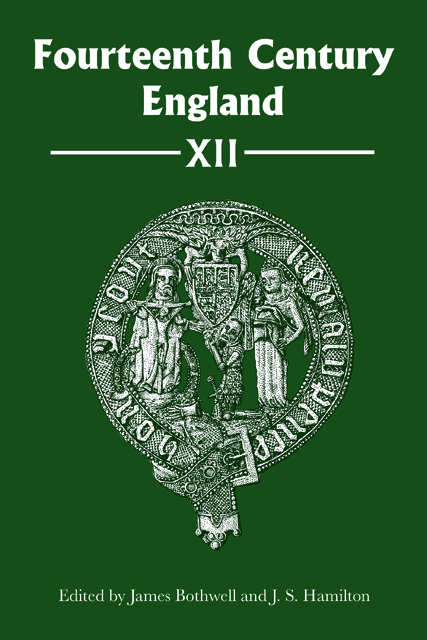Book contents
- Frontmatter
- Contents
- List of Illustrations
- List of Contributors
- Preface
- Abbreviations
- The King’s Confessors and the Royal Conscience in Late Medieval England
- ‘Such maintenance as …’: Corrodies of the Crown
- ‘Vos maisons sount pris al eops le counte’: Walter Bedwyn, Treasurer of York, and the Return of Piers Gaveston
- The Deposition of Edward II: The Kenilworth Embassies
- The English Parliament and the Trial of the ‘Peers of the Land’ in Henry of Lancaster’s Revolt (1328–29): The Origins of a Privilege
- A Brotherhood Uncovered: Investigating the Knightly Following of Thomas Beauchamp, earl of Warwick, 1329–69
- The Black Death and Clerical Prospects in England
- The Last of the Duketti? Richard II, Henry of Monmouth and the House of Lancaster
- Confusion Confounded? The Contrasting Military Fortunes of Sir William Neville (d. c.1391) and Sir William Neville of Pickhill and Rolleston (d. c.1420)
Confusion Confounded? The Contrasting Military Fortunes of Sir William Neville (d. c.1391) and Sir William Neville of Pickhill and Rolleston (d. c.1420)
Published online by Cambridge University Press: 11 January 2023
- Frontmatter
- Contents
- List of Illustrations
- List of Contributors
- Preface
- Abbreviations
- The King’s Confessors and the Royal Conscience in Late Medieval England
- ‘Such maintenance as …’: Corrodies of the Crown
- ‘Vos maisons sount pris al eops le counte’: Walter Bedwyn, Treasurer of York, and the Return of Piers Gaveston
- The Deposition of Edward II: The Kenilworth Embassies
- The English Parliament and the Trial of the ‘Peers of the Land’ in Henry of Lancaster’s Revolt (1328–29): The Origins of a Privilege
- A Brotherhood Uncovered: Investigating the Knightly Following of Thomas Beauchamp, earl of Warwick, 1329–69
- The Black Death and Clerical Prospects in England
- The Last of the Duketti? Richard II, Henry of Monmouth and the House of Lancaster
- Confusion Confounded? The Contrasting Military Fortunes of Sir William Neville (d. c.1391) and Sir William Neville of Pickhill and Rolleston (d. c.1420)
Summary
Sir William Neville (d. 1391) and Sir William Neville of Pickhill and Rolleston (d. c.1420) were almost exact contemporaries, though the latter long outlived the former. For a short period their lives closely overlapped, most obviously when they were involved in the same military campaigns. They also had many acquaintances in common among the nobility and the gentry of Yorkshire and Nottinghamshire, where they both had landed interests or held office – matters which have caused some confusion among historians who have discussed them. Some reasons for that confusion are examined in what follows and efforts are made to distinguish their two careers. These highlight parallels and contrasts between their respective experiences, which naturally display many generally common patterns of gentry life at the end of the fourteenth century. But there is also some more unusual personal evidence that has been overlooked so far in previously published accounts of their lives. Uncertainties nevertheless remain, resolvable only if new evidence is discovered, for if this account reveals anything, it is that a statement in an otherwise fascinating article on Sir William (d. 1391), that ‘earlier work dispense scholars from the need to document their careers in detail’, is a sad dereliction of the historian’s duty to examine critically his or her sources, whether these be original documents or secondary accounts.
The better-known Sir William Neville, who died at Galata, otherwise Pera, across the Golden Horn from Constantinople in October 1391, was probably the youngest son (of six) of Ralph, 4th lord Neville of Raby (d. 1367) and his wife, Alice Audley (d. 1374). His eldest brother, John (d. 1388), with whom he occasionally served, succeeded their father as 5th lord Neville of Raby. He became steward of Edward III’s household in 1371 and, although he was dismissed at the end of the Good Parliament in late June 1376 following charges of corruption and negligence in the conduct of the war, his fortunes later revived sufficiently for him to play a significant part in politics and military affairs under Richard II. Another brother, Alexander (d. 1392), archbishop of York from 1374 onwards, was translated to St Andrews in 1388 as punishment for his support of that king during the Appellant crisis.
- Type
- Chapter
- Information
- Fourteenth Century England XII , pp. 179 - 207Publisher: Boydell & BrewerPrint publication year: 2022



